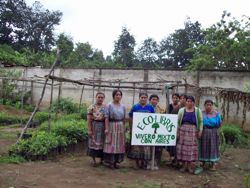How Green are E-Books?
Air Date: Week of February 25, 2011

Eco-Libris plants trees throughout Central America and Africa. One of their planting partners in Guatemala, AIR, has already planted tens of thousands of trees.
Last year, sales of electronic readers skyrocketed in the U.S. As Raz Godelnik, CEO of Eco-Libris, tells host Bruce Gellerman, e-readers don't use any paper, but they still have a significant carbon footprint. For some readers, traditional books are the greener option.
Transcript
GELLERMAN: The ebook is writing a new chapter in the way we read. Last year, Amazon - the online retailer - sold 3 times more electronic books than hardbacks'and for the first time, more ebooks than paperbacks. You might think the revolution in reading - replacing paper with electronic digits - saves on greenhouse gases, but Raz Godelnik has measured the carbon footprint of ebooks, and they don't stack up well against the old-fashioned kind.
Raz Godelnik is the co-founder and CEO of Eco-Libris - it's a company working to green up the book industry in the digital age. He joins us by Skype - and Raz Godelnik, welcome to Living on Earth.
GODELNIK: Thank you!
GELLERMAN: I was amazed to read in an article you wrote that the average paperback is a pretty hefty tome - it has a greenhouse gas footprint of, what, four kilos? That's ten pounds! How is that possible that it should be ten pounds worth of carbon from one little book?

Raz Godelnik is the CEO and co-founder of Eco-Libris (Courtesy Raz Godelnik)
GODELNIK: Well, it's true that it looks like a little book, but the whole manufacturing process is a process that includes cutting of trees, and then using a lot of energy in the manufacturing process in paper mills, and eventually transporting the books to warehouses and then to bookstores. It's a long process, but most of the carbon footprint comes from the beginning of the process - more than 80 percent of the whole carbon footprint of the book.
GELLERMAN: Well let's compare that, say, to an Apple iPad, which only weighs in at about a pound and a half. How big is the Apple iPad's carbon footprint?
GODELNIK: Well according to Apple, the iPad has a carbon footprint that is equal to the footprint of about 32 paper books.
GELLERMAN: One Apple iPad equals the carbon footprint of 32 paperbacks?
GODELNIK: That's true.
GELLERMAN: How about other eReaders? Like, the Kindle?
GODELNIK: So, when it comes to the Kindle, which is the main eReader in the market, the problem is that we don't have any data because Amazon doesn't reveal anything. Not only that Amazon doesn't volunteer to do so, they were asked many times to reveal the carbon footprint or other information related to the footprint of the Kindle, and so far, we just don't have anything from them.

Eco-Libris plants trees throughout Central America and Africa. One of their planting partners in Guatemala, AIR, has already planted tens of thousands of trees.
If we want to make the Kindle more eco-friendly, first we have to know, you know, what's the starting point.
GELLERMAN: So, you want the book industry to turn over a new leaf?
GODELNIK: (Laughs.) Definitely! It's true. When you look at eReaders, most readers assume instinctively that they're greener and better from an environmental point of view because, you know, you save paper. But again, the thing is that we see a new product with some new issues. So, usually when I'm asked if e-reading is greener than traditional reading of paper books, my reply is that it depends.
It depends on the profile of the reader. If you're an avid reader and you read many books, probably the eReader is a greener option for you. But, if you read only a couple of books a year, it might be that paper books - that traditional books are still a better option when it comes to the environmental impact of your reading.
So, it definitely depends, and of course, it also depends on how much time are you going to keep the eReader that you're having or that you're planning to buy. Is it only for one year until the next version will be out, or is it for five years? So, there's definitely no one answer for everyone, but it's an individual answer for each and every reader.
GELLERMAN: One of the things that your company Eco-Libris is trying to do is having people contribute a buck to buy a tree - each time they read a book.
GODELNIK: Oh, yes. One of the things we work on is to make reading more sustainable. And part of our operations is a tree-planting program that we have, where we encourage both readers and publishers to plant trees for the books that they either read or publish, and we have these trees planted in Central America and in Africa - places that suffer from deforestation - where these trees benefit both the environment and the local community.
GELLERMAN: How many trees have you bought so far?
GODELNIK: Well, so far we have planted with our planting partners about 180,000 trees, and we look forward to planting many more.
GELLERMAN: Raz Godenik is CEO of Eco-Libris. Read all about it on our webpage, L-O-E dot O-R-G.
Links
See if e-readers or traditional books are the greenest option for you.
Living on Earth wants to hear from you!
Living on Earth
62 Calef Highway, Suite 212
Lee, NH 03861
Telephone: 617-287-4121
E-mail: comments@loe.org
Newsletter [Click here]
Donate to Living on Earth!
Living on Earth is an independent media program and relies entirely on contributions from listeners and institutions supporting public service. Please donate now to preserve an independent environmental voice.
NewsletterLiving on Earth offers a weekly delivery of the show's rundown to your mailbox. Sign up for our newsletter today!
 Sailors For The Sea: Be the change you want to sea.
Sailors For The Sea: Be the change you want to sea.
 The Grantham Foundation for the Protection of the Environment: Committed to protecting and improving the health of the global environment.
The Grantham Foundation for the Protection of the Environment: Committed to protecting and improving the health of the global environment.
 Contribute to Living on Earth and receive, as our gift to you, an archival print of one of Mark Seth Lender's extraordinary wildlife photographs. Follow the link to see Mark's current collection of photographs.
Contribute to Living on Earth and receive, as our gift to you, an archival print of one of Mark Seth Lender's extraordinary wildlife photographs. Follow the link to see Mark's current collection of photographs.
 Buy a signed copy of Mark Seth Lender's book Smeagull the Seagull & support Living on Earth
Buy a signed copy of Mark Seth Lender's book Smeagull the Seagull & support Living on Earth

